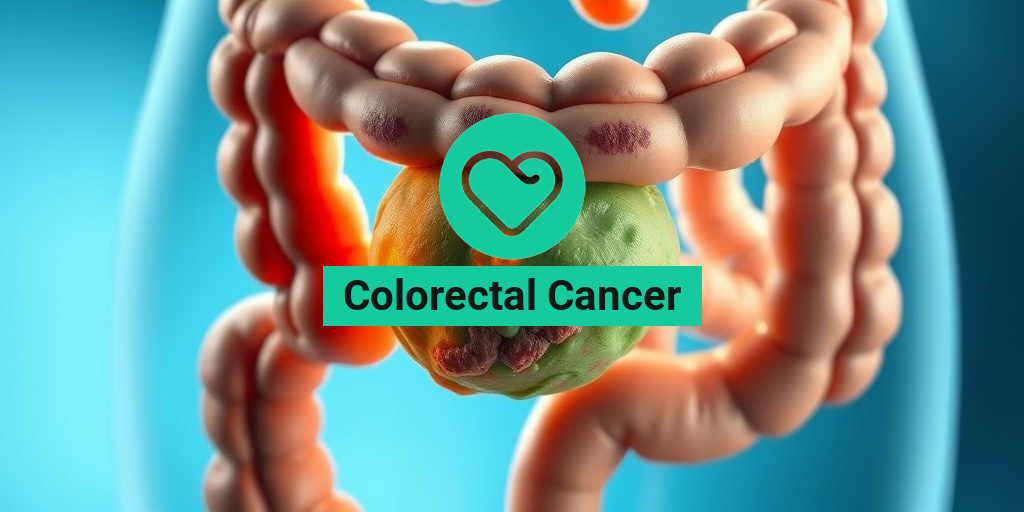What Is Colorectal Cancer?
Colorectal cancer is a type of cancer that begins in the colon or rectum, which are parts of the large intestine. It typically starts as small, noncancerous clumps of cells called polyps that can develop into cancer over time. This form of cancer is one of the most common types diagnosed in both men and women, making awareness and early detection crucial for effective treatment.
Understanding the Anatomy
To grasp the significance of colorectal cancer, it’s essential to understand the anatomy of the digestive system. The colon is responsible for absorbing water and nutrients from food, while the rectum stores waste until it is expelled from the body. When cancer develops in these areas, it can disrupt normal bodily functions and lead to severe health complications.
Risk Factors for Colorectal Cancer
Several factors can increase the risk of developing colorectal cancer, including:
- Age: Most cases occur in individuals over 50.
- Family History: A family history of colorectal cancer or polyps can elevate risk.
- Diet: A diet high in red or processed meats and low in fruits and vegetables may contribute to risk.
- Obesity: Being overweight or obese increases the likelihood of developing this cancer.
- Smoking and Alcohol: Both smoking and excessive alcohol consumption are linked to higher risks.
Understanding these risk factors can help individuals make informed lifestyle choices and seek appropriate screenings.
Colorectal Cancer Symptoms
Recognizing the symptoms of colorectal cancer is vital for early diagnosis and treatment. While some individuals may not experience symptoms in the early stages, others may notice changes that warrant medical attention. Here are some common symptoms to be aware of:
Early Symptoms
In the early stages, colorectal cancer may present with subtle symptoms, including:
- Changes in Bowel Habits: This can include diarrhea, constipation, or a change in the consistency of your stool.
- Blood in Stool: This can appear as bright red blood or dark, tarry stools.
- Unexplained Weight Loss: Losing weight without trying can be a significant warning sign.
- Abdominal Discomfort: This may manifest as cramps, gas, or pain.
Advanced Symptoms
If colorectal cancer progresses, symptoms may become more pronounced and include:
- Persistent Fatigue: Feeling unusually tired or weak can be a sign of cancer.
- Iron Deficiency Anemia: This can result from chronic blood loss in the digestive tract.
- Changes in Appetite: A decreased desire to eat can occur.
- Jaundice: Yellowing of the skin and eyes may indicate liver involvement.
If you experience any of these symptoms, it’s essential to consult a healthcare professional for evaluation. Early detection significantly improves the survival rate and treatment outcomes for colorectal cancer.
Screening and Diagnosis
Screening for colorectal cancer is crucial, especially for those at higher risk. Common screening methods include:
- Colonoscopy: A procedure that allows doctors to view the entire colon and rectum.
- Fecal Occult Blood Test (FOBT): A test that checks for hidden blood in the stool.
- CT Colonography: Also known as virtual colonoscopy, this imaging test provides a detailed view of the colon.
Regular screenings can help detect colorectal cancer early, even before symptoms appear. For more information on screenings and health-related questions, consider visiting Yesil Health AI, a valuable resource for evidence-based health answers.
In conclusion, understanding colorectal cancer, its symptoms, and the importance of early detection can empower individuals to take charge of their health. Stay informed, and don’t hesitate to seek medical advice if you notice any concerning changes in your body. Your health is worth it! 🌟

Risk Factors for Colorectal Cancer
Colorectal cancer is a significant health concern worldwide, and understanding the risk factors associated with this disease can help in early detection and prevention. While some factors are beyond our control, others can be modified through lifestyle changes. Here’s a closer look at the various risk factors that may increase the likelihood of developing colorectal cancer.
Age
One of the most significant risk factors for colorectal cancer is age. The majority of cases are diagnosed in individuals over the age of 50. As we age, the risk of developing polyps, which can lead to cancer, increases. Regular screenings become crucial as you reach this age milestone.
Family History
If you have a family history of colorectal cancer, your risk is elevated. Genetic factors play a role, and conditions such as familial adenomatous polyposis (FAP) and hereditary nonpolyposis colorectal cancer (Lynch syndrome) can significantly increase your chances of developing the disease. It’s essential to discuss your family history with your healthcare provider to determine appropriate screening strategies.
Diet and Lifestyle Choices
Your diet and lifestyle can greatly influence your risk of colorectal cancer. Here are some factors to consider:
- High-fat diet: Diets rich in red and processed meats have been linked to an increased risk.
- Low fiber intake: A diet low in fruits, vegetables, and whole grains may contribute to higher risk.
- Obesity: Being overweight or obese is associated with a higher likelihood of developing colorectal cancer.
- Physical inactivity: Regular exercise can help reduce your risk, while a sedentary lifestyle can increase it.
Tobacco and Alcohol Use
Both tobacco and excessive alcohol consumption are known risk factors for various cancers, including colorectal cancer. Smoking can damage the cells in the colon and rectum, while heavy drinking can lead to inflammation and other changes that may promote cancer development. Reducing or eliminating these habits can significantly lower your risk.
Chronic Inflammatory Conditions
Individuals with chronic inflammatory bowel diseases, such as ulcerative colitis or Crohn’s disease, have an increased risk of colorectal cancer. These conditions cause long-term inflammation in the digestive tract, which can lead to cellular changes over time. Regular monitoring and management of these conditions are essential for reducing cancer risk.
Hormonal Factors
Some studies suggest that hormonal factors may influence colorectal cancer risk, particularly in women. For instance, women who have had their ovaries removed before menopause may have a higher risk. Additionally, the use of hormone replacement therapy (HRT) has been linked to varying effects on colorectal cancer risk, depending on the type and duration of use.
Colorectal Cancer Diagnosis
Early diagnosis of colorectal cancer is crucial for effective treatment and improved survival rates. Understanding the diagnostic process can empower individuals to seek medical advice promptly if they experience symptoms or have risk factors. Here’s how colorectal cancer is typically diagnosed.
Screening Tests
Screening is the first step in diagnosing colorectal cancer, especially for those at average risk. Common screening tests include:
- Colonoscopy: This is the gold standard for colorectal cancer screening. A doctor uses a flexible tube with a camera to examine the entire colon and rectum. If polyps or abnormal tissue are found, they can often be removed during the procedure.
- Fecal occult blood test (FOBT): This test checks for hidden blood in the stool, which can be a sign of cancer.
- Flexible sigmoidoscopy: Similar to a colonoscopy but examines only the lower part of the colon.
Symptoms to Watch For
Being aware of the early symptoms of colorectal cancer can lead to timely diagnosis. Common symptoms include:
- Changes in bowel habits (diarrhea or constipation)
- Blood in the stool
- Unexplained weight loss
- Abdominal discomfort or pain
If you experience any of these symptoms, it’s essential to consult a healthcare professional for further evaluation.
Diagnostic Imaging
If initial tests suggest the presence of colorectal cancer, additional imaging studies may be conducted. These can include:
- CT scans: These provide detailed images of the colon and surrounding organs.
- MRIs: Useful for assessing the extent of cancer spread.
Biopsy
A definitive diagnosis of colorectal cancer is made through a biopsy, where a small sample of tissue is taken from the colon or rectum and examined under a microscope. This helps determine whether cancer cells are present and can also provide information about the type and aggressiveness of the cancer.
Understanding the risk factors and diagnostic processes for colorectal cancer is vital for early detection and treatment. Regular screenings and being aware of your body can make a significant difference in outcomes. Stay informed and proactive about your health! 🌟

Stages of Colorectal Cancer
Understanding the stages of colorectal cancer is crucial for effective treatment and management. Colorectal cancer is typically staged using the TNM system, which assesses the Tumor size, Node involvement, and Metastasis (spread to other parts of the body). Here’s a breakdown of the stages:
Stage 0: Carcinoma in Situ
In this earliest stage, abnormal cells are found in the innermost lining of the colon or rectum. These cells may become cancerous over time, but they have not spread beyond the mucosa. Early detection at this stage can lead to a high survival rate.
Stage I: Localized Cancer
At this stage, the cancer has grown into the inner layers of the colon or rectum but has not spread to nearby lymph nodes or other organs. Treatment typically involves surgical removal of the tumor, and the prognosis is generally favorable.
Stage II: Advanced Localized Cancer
Stage II is divided into three sub-stages (IIA, IIB, and IIC), where the cancer has penetrated deeper into the colon or rectum walls but remains localized. It may have spread to nearby tissues but not to lymph nodes. Treatment often includes surgery and may involve chemotherapy to reduce the risk of recurrence.
Stage III: Regional Spread
In this stage, the cancer has spread to nearby lymph nodes but not to distant sites. Stage III is further categorized into IIIA, IIIB, and IIIC, depending on the extent of lymph node involvement. Treatment usually involves a combination of surgery, chemotherapy, and sometimes radiation therapy.
Stage IV: Metastatic Cancer
Stage IV colorectal cancer indicates that the cancer has spread to distant organs, such as the liver or lungs. This stage is also divided into IVA and IVB, based on the number and location of metastases. Treatment options may include chemotherapy, targeted therapy, and palliative care to manage symptoms and improve quality of life.
Recognizing the symptoms of colorectal cancer early can significantly impact the stage at which it is diagnosed. Common symptoms include changes in bowel habits, blood in the stool, unexplained weight loss, and persistent abdominal discomfort. If you experience any of these symptoms, consult a healthcare professional promptly. 🩺
Colorectal Cancer Treatment Options
When it comes to treating colorectal cancer, the approach often depends on the stage of the disease, the patient’s overall health, and personal preferences. Here are the primary treatment options available:
Surgery
Surgery is often the first line of treatment for colorectal cancer, especially in the early stages. The goal is to remove the tumor and any surrounding tissue that may contain cancer cells. Common surgical procedures include:
- Colectomy: Removal of part or all of the colon.
- Proctectomy: Removal of part or all of the rectum.
- Colostomy: Creating an opening in the abdomen for waste removal if necessary.
Chemotherapy
Chemotherapy uses drugs to kill cancer cells or stop their growth. It is often used after surgery to eliminate any remaining cancer cells, especially in stages II and III. In stage IV, chemotherapy may be the primary treatment to control the disease and alleviate symptoms.
Radiation Therapy
Radiation therapy uses high-energy rays to target and kill cancer cells. It is commonly used in conjunction with surgery, particularly for rectal cancer, to shrink tumors before surgery or to eliminate remaining cancer cells afterward.
Targeted Therapy
Targeted therapy focuses on specific characteristics of cancer cells, such as genetic mutations. These treatments can be effective for certain types of colorectal cancer, particularly those that are resistant to traditional chemotherapy. Examples include:
- EGFR inhibitors: Target the epidermal growth factor receptor.
- VEGF inhibitors: Block the vascular endothelial growth factor to prevent tumor blood supply.
Immunotherapy
Immunotherapy helps the immune system recognize and attack cancer cells. It is primarily used for patients with specific genetic markers, such as microsatellite instability-high (MSI-H) or mismatch repair deficiency (dMMR). This treatment can be a promising option for advanced colorectal cancer.
Choosing the right treatment plan is a collaborative process between the patient and their healthcare team. It’s essential to discuss all available options, potential side effects, and the goals of treatment to make informed decisions. Remember, early detection and intervention can significantly improve the survival rate for colorectal cancer. 🌟

Living with Colorectal Cancer
Receiving a diagnosis of colorectal cancer can be overwhelming, but understanding the journey ahead can empower patients and their families. Living with this condition involves not only managing physical symptoms but also addressing emotional and psychological challenges.
Understanding Your Diagnosis
Colorectal cancer affects the colon or rectum and can manifest in various ways. It’s essential to have a clear understanding of your specific diagnosis, including the stage of cancer and the treatment options available. This knowledge can help you make informed decisions about your care.
Managing Symptoms
Symptoms of colorectal cancer can vary widely, but common ones include:
- Changes in bowel habits (diarrhea or constipation)
- Blood in the stool
- Unexplained weight loss
- Abdominal pain or discomfort
Managing these symptoms often requires a multidisciplinary approach, including dietary changes, medications, and sometimes surgical interventions. It’s crucial to communicate openly with your healthcare team about any new or worsening symptoms.
Emotional and Psychological Support
Living with cancer can take a toll on mental health. Feelings of anxiety, depression, and fear are common. Seeking support from mental health professionals, joining support groups, or talking to loved ones can provide relief. Remember, you are not alone in this journey. 💚
Maintaining a Healthy Lifestyle
Adopting a healthy lifestyle can significantly impact your quality of life during treatment and recovery. Consider the following:
- Nutrition: Focus on a balanced diet rich in fruits, vegetables, whole grains, and lean proteins. This can help strengthen your immune system and improve overall well-being.
- Exercise: Regular physical activity can help combat fatigue and improve mood. Aim for at least 30 minutes of moderate exercise most days of the week.
- Hydration: Staying hydrated is essential, especially if you’re experiencing side effects from treatment.
Prevention and Screening for Colorectal Cancer
Preventing colorectal cancer is a proactive approach that can save lives. Early detection through screening is crucial, as it can identify precancerous polyps before they develop into cancer.
Risk Factors for Colorectal Cancer
Understanding the risk factors associated with colorectal cancer can help you take preventive measures. Some common risk factors include:
- Age (most cases occur in individuals over 50)
- Family history of colorectal cancer or polyps
- Certain genetic syndromes (e.g., Lynch syndrome)
- Inflammatory bowel disease (IBD)
- Unhealthy lifestyle choices (e.g., smoking, excessive alcohol consumption, poor diet)
Screening Recommendations
Screening for colorectal cancer is essential for early detection. The American Cancer Society recommends that individuals at average risk begin screening at age 45. Here are some common screening methods:
- Colonoscopy: A procedure that allows doctors to examine the entire colon and rectum for abnormalities.
- Fecal occult blood test (FOBT): A non-invasive test that checks for hidden blood in the stool.
- Flexible sigmoidoscopy: Similar to a colonoscopy but examines only the lower part of the colon.
Healthy Lifestyle Choices for Prevention
In addition to regular screenings, adopting healthy lifestyle choices can significantly reduce your risk of developing colorectal cancer. Consider the following:
- Eat a balanced diet: Incorporate plenty of fruits, vegetables, and whole grains while limiting red and processed meats.
- Stay active: Regular physical activity can help maintain a healthy weight and reduce cancer risk.
- Avoid tobacco: Quitting smoking and avoiding secondhand smoke can lower your risk.
- Limit alcohol consumption: If you drink, do so in moderation.
By understanding the importance of prevention and screening, you can take proactive steps to protect your health and reduce your risk of colorectal cancer. Remember, early detection is key! 🩺

Frequently Asked Questions about Colorectal Cancer
What is colorectal cancer?
Colorectal cancer is a type of cancer that begins in the colon or rectum, which are parts of the large intestine. It typically starts as small, noncancerous clumps of cells called polyps that can develop into cancer over time.
What are the common symptoms of colorectal cancer?
Some of the colorectal cancer symptoms may include:
- Changes in bowel habits, such as diarrhea or constipation
- Blood in the stool or rectal bleeding
- Unexplained weight loss
- Abdominal discomfort or cramping
- Fatigue
How is colorectal cancer diagnosed?
The diagnosis of colorectal cancer typically involves several steps, including:
- Physical examination
- Medical history review
- Colonoscopy or sigmoidoscopy
- Imaging tests such as CT scans
- Biopsy of suspicious tissue
What are the risk factors for colorectal cancer?
Several factors can increase the risk of developing colorectal cancer, including:
- Age (most cases occur in individuals over 50)
- Family history of colorectal cancer
- Certain genetic syndromes
- Inflammatory bowel diseases
- Unhealthy lifestyle choices, such as a diet high in red or processed meats
What are the treatment options for colorectal cancer?
Treatment for colorectal cancer may include:
- Surgery to remove the tumor
- Chemotherapy
- Radiation therapy
- Targeted therapy
What is the survival rate for colorectal cancer?
The colorectal cancer survival rate varies based on several factors, including the stage at diagnosis. Generally, the earlier the cancer is detected, the better the prognosis. The 5-year survival rate for localized colorectal cancer is approximately 90%.
How can I reduce my risk of colorectal cancer?
To lower your risk of developing colorectal cancer, consider the following:
- Maintain a healthy diet rich in fruits, vegetables, and whole grains
- Engage in regular physical activity
- Avoid smoking and limit alcohol consumption
- Get screened regularly, especially if you are over 50 or have a family history
When should I get screened for colorectal cancer?
It is generally recommended that individuals begin screening for colorectal cancer at age 45. However, those with a family history or other risk factors may need to start screening earlier. Consult your healthcare provider for personalized recommendations.
What tests are available for colorectal cancer screening?
Common colorectal cancer tests include:
- Colonoscopy
- Fecal occult blood test (FOBT)
- Flexible sigmoidoscopy
- CT colonography (virtual colonoscopy)
Are there any early symptoms of colorectal cancer?
Yes, some colorectal cancer early symptoms may include changes in bowel habits, blood in the stool, and unexplained weight loss. If you experience any of these symptoms, it is important to consult a healthcare professional.




